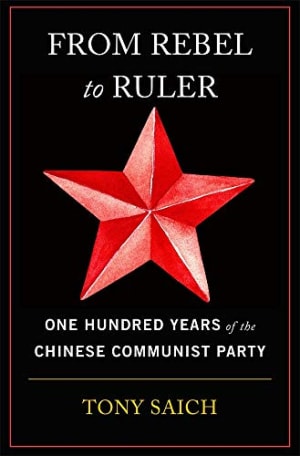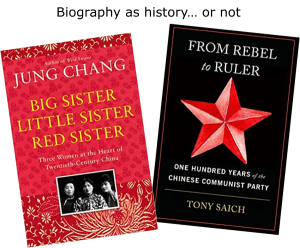This is a book about the three most famous sisters in Chinese history: the Soong sisters. They were international celebrities: highly educated, politically pivotal and ridiculously rich. They embodied the changes and tensions of early twentieth century China as the country set its political engine-room to warp speed 9: in a little over 30 years the country went from empire, to parliamentary democracy, to warlordism, to quasi-fascist dictatorship to foreign occupation and civil war before becoming a totalitarian one party communist state.
Who were these sisters?
The Soong sisters lived through this period intimately connected to the political movers and shakers. The youngest sister – Mai-ling – was the wife of the nationalist leader Chiang Kai-shek. The middle sister – Ching-ling (aka Red Sister) – was the wife of Sun Yat-sen (the father of modern China). Ching-ling was subsequently a devoted supporter of the communists. The eldest sister Ei-ling was married to the nationalist finance minister and direct male-line descendent of Confucius, H.H. Kung. She was also financially astute and shamelessly corrupt, amassing one of the largest fortunes in Republican China.
Big Sister, Little Sister, Red Sister, Husband of Red Sister, Husband of Little Sister
By necessity the story is not only about the three sisters. It is as well about the “programme-setters and history-changers” that the author has also researched thoroughly over the last few years.
So Sun Yat-sen the aforementioned “father” of modern China, and Chiang Kai-shek the nationalist leader / dictator get at least as much if not more attention.
This is partly because the sisters lives are so bound up with these two towering figures, but also because Jung Chang portrays history as a fundamentally personal process and so wants to get as close as possible to the people who “made history”: what were the motives for their decisions and how did their personalities affect the course of events.
Getting close to in this case means giving the dirty laundry a good airing.
Sun Yat-sen, the bad father of China
Sun Yat-sen’s sheet inspection is particularly interesting. I have come across him in other books where he is presented as a slightly otherworldly sage-like politician who was a key inspiration for the creation of post-empire republican China but refused to sully himself with the direct exercise of political power.
In Big Sister, Little Sister, Red Sister he is the polar opposite: a two-dimensional megalomaniac douche-bag. The reason he didn’t achieve ultimate power was not reticence, it was incompetence.
Puncturing the mystique
To illustrate this with an example from the book: in 1922 Sun was inciting an army under his nominal control to launch an unprovoked attack on the democratically elected government in Beijing in order to install himself as president. When the commander of these soldiers refused to do as he was told Sun publicly threatened to shell him and his troops with poison gas. Thus provoked the commander then attacked Sun’s (fortified) house / palace in Canton in order to force Sun from office.
Quietly sneaking away before the attack started, Sun left his then pregnant wife Ching-ling (the titular Red Sister) to hold the outnumbered, outgunned and surrounded fort. When they were almost out of ammunition she decided that she had to make a run for it. Under heavy fire, with attendants shot and killed beside her, she began an exhausting two day ordeal that included fainting, feigning death in the middle of the street, and tragically suffering a miscarriage that meant that she was never able to have children.
Meanwhile and early in the attack Sun had reach his gunboats close off-shore and was now shelling Canton more or less indiscriminately.
Using his wife as bait
During this entire episode he had done absolutely nothing to help his pregnant wife, not even sending word that he was safe aboard his boat – which he had reached even before the attack began. According to Chang “Sun clearly intended to make his wife the bait so that the charge would develop into a heated battle. This gave Sun an excuse to bombard Canton from his gunboats.”
These are not the actions of a dreamy revolutionary who only wanted the best for China, they are consistent with a man who was willing to see the Chinese people suffer – including those closest to him – in order to satisfy his outsized ambition.
In telling the story of Ching-ling, Ei-ling and Mai-ling Chang wants to provide a window into the politics of the period and shine a light on some uncomfortable truths.
The writing style
The book is written in a breezy and accessible style. I found it easy to read with a clear narrative thread. Chang expertly blends the life stories of the three sisters to guide us through the history of early modern China.
She also has a good eye for an anecdote: with perhaps the most memorable one being the toilet habits of the first president of China Yuan Shi-kai (new fangled flushing toilets in the presidential palace were less comfortable than his trusty old wooden poo stool – and we can guess it wasn’t him cleaning up the mess).
Overall it is enjoyable and packed with detail. However it suffers in my view from an important flaw.
The pitfalls of biography as history
Written in biographical style the book explains all of the key historical events as the outcome of personal decisions.
In some cases this leaves big unanswered questions. For example: Sun Yat-sen is described as the number one villain who undermined democratic republican China because he was quite willing to destroy the fragile but precious political equilibrium in order to satisfy his personal lust for power. The final blow came when he effectively promised away huge tracts of traditionally Chinese territory to Soviet Russia in exchange for the training of a well drilled modern army that – after his death – was used to crush the parliamentary system.
I can accept that Sun Yat-sen was reprehensible particularly to those who stood in his way. I can accept too that he was willing to cut shady deals with foreign powers that were in his but not China’s interest – presumably he meant to break any promises he made. (Although I should point out that these are two very inflammatory statements even today.)
Leadership in a vacuum
But what we are not told is why people still followed his lead? Why did his opinion matter? What was it that made people listen to him? Without influence all these destructive dreams mean nothing. I am non the wiser after reading this account, but to say it was all Sun’s fault seems superficial to say the least.
In other cases Chang’s biography as history approach seems unbelievable bordering on preposterous.
For want of a son… the kingdom was lost
The clearest example of this is the explanation of why Chiang Kai-shek never managed to destroy the communists in China despite coming close. The author’s explanation is that it was because Chiang’s son was being held hostage in Russia: in order to preserve his son he deliberately refrained from the killer blow. So when the communists (including Mao Zedong) were driven out of the South East of China and had to flee thousands of miles northwards on the “Long March” Jung Chang notes “that the Reds were able to survive it, was fundamentally thanks to Chiang Kai-shek’s design to have his son released.”
In my view this is redundant as a causal explanation and it is inconsistent with all of Chiang’s actions and words that I am aware of. It also denies agency to anyone other than Chiang, and is only necessary if you want to go back to history as the will of “great men” without anyone else getting a look in.
Idiosyncratic interpretations
The book also stood out for me in its slightly left-field take on some well known events. So for example the “warlord period” of Chinese history – broadly speaking the 1920s – is for Chang an unfairly maligned episode: while there were multiple armies across the country all fighting each other, they weren’t really trying that hard – “Fatalities were low” – and “At the first drop of rain, fighting stopped and the umbrellas were opened, turning the battlegrounds into fields of colourful mushrooms.” Presumably if it had rained all the time no-one would have died at all.
Double plusses
With these health warnings in place: where it really succeeds for me is with the framing of the narrative by the lifetime of the three sisters. With Mei-ling being the last to pass away in 2003, it moves beyond the stopping points of traditional histories. For Chinese history this can often mean 1949 when the communists took power. But Chang diverts us to Taiwan where Mei-ling lived with Chiang Kai-shek and gives us an insight into another 50 years of fascinating changes that are very relevant to the headlines today.
The three sisters also act as natural bridges, between historical periods as noted above, but also between different points of view – with Ching-ling as the Red Sister having a very different outlook on the world to Ei-Ling the Big Sister. And despite these differences in politics they managed to sustain a warm relationship between the three of them that is part of the charm of this book.
Conclusion
I would recommend this book for anyone with an interest in early 20th Century China. Using the three sisters it brings the politics of the period to life. You will get most out of it if you already have some knowledge of this period because you will then be able to appreciate just how controversial Chang is on occasion – and also weigh up more independently whether you think she is right or wrong in her judgements. It is these judgements – which for me come across as superficial and / or misguided on critical points – that prevent a good book from being a great one.
Book details
(back to top)- Title -
Big Sister, Little Sister, Red Sister : Three Women at the Heart of Twentieth-Century China
- Author -
Jung Chang
- Publication date -
October 2019
- Publisher -
Penguin
- Pages -
400
- ISBN 13 -
978-1910702789
- Podcast episode -
How To Academy Podcast: Jung Chang – Three Women at the Heart of Twentieth-Century China
- Podcast episode -
The Book Club: Jung Chang Big Sister Little Sister Red Sister
- Amazon UK -
- Amazon US -



